News
TINUBU’S INTERVENTION IN DANGOTE REFINERY, NNPC’s TUSSLE
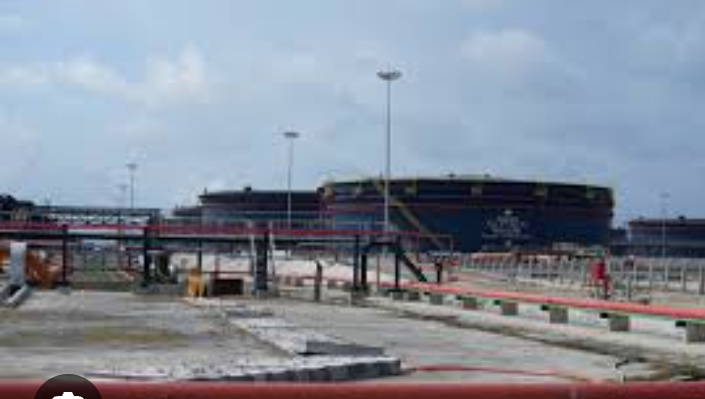
BY BOLAJI AFOLABI
Until a few weeks back, a vast majority of Nigerians probably did not know, and never heard the name before. Perhaps, just a few in and around the highly lucrative oil sector know him. But all that changed on June 18, 2024, when he delivered an incongruous statement that not only shook the highly lucrative sector but also snowballed into a frenzy, creating palpable tension in the polity. While addressing journalists in Port Harcourt, Farouk Ahmed, Chief Executive Officer, Nigerian Midstream and Downstream Petroleum Regulatory Authority, (NMDPRA) said: “Dangote Refinery is still in the pre-commissioning stage. It has not being licensed yet. We have not licensed them yet.”
Taken aback by his comments, even as journalists were still processing Ahmed’s comment, the NMDPRA boss went further: “I think they are at about 45 percent completion …… so, in terms of quality, currently, the AGO quality in terms of sulphur is the lowest as far as West Africa’s requirement of 50 ppm is concerned.” Not done, Ahmed threw a sucker punch: “Dangote Refinery as well as some (other) refineries produce between 650 to 1,200 ppm …..so, in terms of quality, their quality is much more inferior to the imported quality.”
As expected, Farouk’s “Port Harcourt homily” has reverberated across the sector. It has elicited public outrage from primordial and latter-day oil and gas experts, public analysts, economic experts, social commentators, the media and all. While some view it as insouciant and discombulated, few others equate it with a display of crass arrogance. They perceive it as calculated mischief and an expression of bottled emotions. Popular opinion was that Ahmed’s statement could be inimical to the growth of the nation’s energy sector where Dangote leads with his recent multibillion dollar investment. Smaller, smarter modular refineries are also becoming attractive to many investors keen on contributing to national economic development.
Disturbed about Ahmed’s inglorious, infamous tantrums, an otherwise unobtrusive, sober and measured Aliko Dangote, had to come out from his quiet and withdrawn cocoon to engage the sector’s regulatory agencies. Africa’s richest investor among many things spoke about alleged sabotage by some elements within the oil sector; about the inability of International Oil Companies, (IOCs) to supply crude to his refinery and booby traps aimed at frustrating the refinery. The billionaire entrepreneur concluded that the comments were aimed to soil and sully his integrity and pooh-pooh his uncommon investment in the nation’s economy. Some industry experts agreed that the disparaging, denigrating, and derogatory comments by Ahmed could be likened to “the voice of Jacob and hand of Esau.”
Worried about the future of his monumental perspiration in enabling the project, Dangote as though speaking for the energy sector released a statement on July 21, 2024, detailing his refinery’s position and other necessary details for national information and enlightenment. The refinery’s products according to him, do not only comply with set standards but have also been scientifically confirmed to surpass the quality of similar products elsewhere. Waxing technical, Dangote said a “parts per million” (ppm) what is now at 32 which was a massive leap from previous 665ppm – considered the best quality in Nigeria at that time. The world’s largest single train refinery is therefore superior in quality compared to imported equivalents. His refinery he stated, was already exporting products to some European countries and Singapore.
From available data, the $20 billion Dollars facility is designed to process a wide range of products including Africa and Middle Eastern crude, and the USA Light Tight. At full capacity, it can meet the country’s entire demand for petrol, diesel, kerosene, and jet fuel as well as having surpluses for export. Also, it is ingeniously designed and operated to comply with the USA Environmental Protection Agency, (EPA); European emission norms; Department of Petroleum Resources, (DPR) emission and effluent norms; the African Refiners & Distribution Association, (ARDA) standards, and other global requirements. According to comments by oil and gas experts, there are undeniable proofs that Dangote Refinery, and other modular refineries including Aradel, Waltersmith, and few others meet every operational and environmental standard as set by national, regional, and global regulatory agencies. So, why the growing attacks and denigration of home-based enterprise by regulatory agencies.
Given the national importance of the matter, and considering its possible micro and macro effects of national economy, energy security, and technology development, the House of Representatives, which also has oversight responsibilities over federal regulatory agencies, and players in the sector waded into the matter. In a first of it’s kind excursion, the leadership of the 360-member parliament visited at the refinery for on-the-spot assessment of the facility. Speaker Abass Tajudeen lauded Dangote for establishing the refinery which is a significant asset in Nigeria’s quest for self-sufficiency in petroleum products. He lauded Dangote for positioning the behemoth as beacon of hope for Nigeria to navigate through the turbulent waters of energy supply challenges. Tajudeen noted that the technological monument was a critical stride in the transformation the landscape of petroleum production in Nigeria and contributing immensely to employment generation.
An obviously frustrated Dangote thanked the lawmakers for their timely response which underscores their firm commitment to national development. The multivalent industrialist enjoined the National Assembly to set up a high-powered committee to ascertain the veracity of the brickbats on the refinery. He advocated impartial assessment to unravel hidden matters, determine what best serves the interest of Nigeria and promised to adhere to whatever resolutions reached by the parliament. Peeved by the antics of regulators to slow-down the smooth commencement of full operations at the refinery, a usually quiet, calm and cool-tempered Dangote further revealed that the regulators actions are detrimental to the technological emancipation and economic development of the most-populous black nation in the world.
Not minding the mindless strip and savage tactics, wrongful vilification, and vacuous intentions deployed, and exhibited in throwing darts at Dangote and other private players in the industry, majority of Nigerians are sympathetic to the plight of these businessmen. Without prejudice to any of their past errors, many people believe that Dangote, Waltersmith, Aradel, and other modular refineries have demonstrated unusual patriotism, grit and ruggedness in championing a noble and novel cause. These indigenous companies that are dedicated to the exploration and production of oil and gas resources have overcome numerous natural encumbrances and human treachery on their pathways.
Aside their successful forays into the murky, vicious, and slanderous oil sector which is filled with perennial backstabbing and blackmailing, they are also making veritable in-roads into other sub-sector of the industry which in the long run will be of immense benefit to Nigeria and citizens. Just as Dangote refinery is projected to earn over $25 billion dollars in revenue and exports when fully operational, other modular refineries are also contributing respectably towards solving economic challenges. Waltersmith’s 5,000bpd modular refinery which successfully began commercial exports from it’s Ibigwe field, Imo state in 2008, contributing about 300 million litres of refined products annually is not only providing direct and indirect employment but also growing local and national economy. Same can be said of the Aradel Refinery which produces about 11,000bpd, and Agbarha-Otor Refinery which hopes to produce about 60,000 bpd and is expected to commence commercial operations in November 2024.
Contrary to whatever invertebrate narratives and puerile conjectures being bandied about the state of these refineries, their operational guidelines, and corporate governance is anchored on strict adherence to global best practices. They ensure that every level of operations must be done rightly, transparently, and methodically in conformity with laid down rules and procedures. Accusations that Dangote is monopolistic is extremely petty, lazy, and nonsensical. The NNPC has been a perennial drainpipe on the nation’s economy, as its four refineries are under eternal turnaround maintenance while idle workers are permanently on the country’s wage bill.
Even if the NMDPRA’s position is true, Dangote, and other Nigerian-owned refineries deserve better from the regulatory agencies. Their actions clearly contradicts the agenda of Federal Government in boosting local industries, and attracting offshore investors. Perhaps one needs to reiterate that for any country to get foreign direct investment, every potential investor takes frank, and unambiguous assessment of such country’s industrial policy. The comments of NMDPRA, and position of other regulatory agencies about Dangote, and other modular refineries is inimical to the vision of government in it’s quest for meaningful economic growth of all sectors, particularly the oil sector which is the live wire of national development.
Happily, President Bola Tinubu has taken bold, decisive decision by directing the NNPC to ensure Dangote and other refineries procure crude oil in Naira. This laudable intervention coming immediately after Senator Heineken Lokpobiri’s; Petroleum Resources Minister (Oil) meeting with Dangote, and leadership of NNPC, NMDPRA and NUPRC is timely and pro-active. With the presidential directive, it is expected that the hedges and beef between Dangote and NNPC will be fully resolved in national interest such that the refinery and other modular refineries can function without encumbrances. Nigerians are hopeful that with the resolution of the needless impasse, Dangote and other modular refineries producing at full capacities, would bring numerous positives to the sector and Nigeria’s economy. There would be availability of products and domestic supply security; employment generation; boosting SMEs operations; increased foreign exchange reserves; technology development; improved GDP; economic diversification; establishment of manufacturing industries and other benefits.
*BOLAJI AFOLABI, a development communications specialist, was with the Office of Public Affairs in The Presidency.*
News
Chelsea, Brentford shares the spoil in premier league’s goalless draw

Chelsea’s frustrations on the road continued on Sunday as they played out a drab 0-0 draw against Brentford in the Premier League. The fourth-placed Blues, desperate to solidify their position in the race for Champions League qualification, delivered another uninspiring display under manager Enzo Maresca. Much of the attention was focused on the decision to bench England forward Cole Palmer for almost an hour, sparking questions about the Italian boss’s priorities ahead of a crucial UEFA Conference League quarter-final clash with Legia Warsaw on Thursday. When Palmer was finally introduced, his impact was muted, with his only significant contribution being a missed chance over the crossbar.
Chelsea have a UEFA Conference League quarter-final trip to Legia Warsaw on Thursday, but Maresca’s priorities were questioned following the Blues’ insipid display.
The match itself offered little excitement, highlighting the struggles of both sides. Brentford, battling their own challenges of form at home, seemed unable to capitalize on Chelsea’s sluggish performance. Despite the Blues’ attempts to gain control, Maresca’s cautious tactical approach failed to generate clear-cut opportunities for his team. With Chelsea winless away from home in the league since December, the encounter at the Brentford Community Stadium was emblematic of their recurring troubles on the road. Fans and analysts alike questioned whether Maresca’s approach was adequate for a team still fighting for Champions League qualification amid an increasingly competitive field.
The spotlight on Cole Palmer’s absence from the starting lineup was another defining feature of the match. The England forward, widely regarded as a key player for Chelsea this season, could have provided the creativity and attacking edge the Blues sorely lacked throughout the game. Maresca’s decision to hold Palmer back drew criticism, especially given the urgency of securing vital points for Chelsea’s league ambitions. When Palmer did make his long-awaited entrance, the young star struggled to find his rhythm, leaving fans disappointed and underscoring the broader issues in Chelsea’s attacking play.
With Manchester City breathing down Chelsea’s neck in the Premier League standings, the stakes for Sunday’s result were high. The goalless draw opened the door for fifth-placed City to overtake Chelsea should they secure a win against Manchester United in the day’s late fixture. For the Blues, the outcome not only added pressure to their domestic campaign but also cast a shadow over their upcoming Europa Conference League clash. Maresca now faces the dual challenge of rejuvenating Chelsea’s confidence in Europe while addressing their league form, which could ultimately determine their fate in the pursuit of Champions League football next season.
Top copy trading platform
Discover the best copy trading platform. Copy expert traders’ strategies on Deriv cTrader.
Deriv.com
by TaboolaSponsored Links
The result also extended Brentford’s struggles at home, as they continued their winless streak in front of their fans. Both teams leave the match with unanswered questions about their form, tactics, and aspirations as the Premier League season enters a critical phase. For Chelsea, the disappointment underscores the need for decisive action from Maresca and his squad as they prepare for crucial fixtures on both domestic and continental fronts. Brentford, meanwhile, will aim to regroup and find ways to regain momentum in their remaining matches. The uneventful encounter serves as a reminder of the challenges faced by teams vying to navigate the pressure of top-flight football.
News
“How we imortalised Olunloyo before his death-Makinde
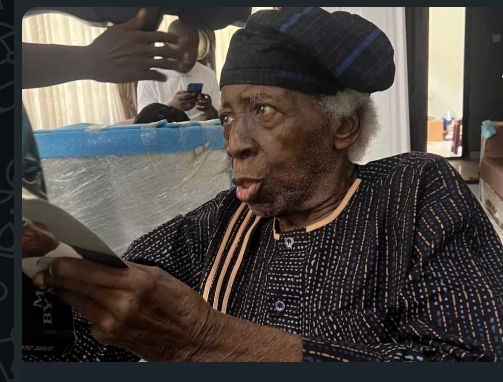
By Kayode Sanni-Arewa
Governor of Oyo State, Seyi Makinde has said he is happy that former governor of the State, Omololu Olunloyo was imortalised before his demise.
Makinde, in a condolence message by his media aide Sulaimon Olanrewaju on Sunday, said the country had lost a patriotic leader, an icon and one of its most cerebral former administrators with the politician’s demise.
The governor said it is sad that the late mathematical guru and administrator passed away before his 90th birthday.
“This death hits differently because I was looking forward to Baba’s 90th birthday, which would have come up on April 14. However, we have to submit to the will of God, who gives and takes lives as He wills.
“My joy is that our government immortalised and honoured Pa Olunloyo in his lifetime and he was present to witness it as we named the Ibadan Airport Road and the Leisure Park on the axis after him in recognition of his service to the state.
“May the Lord grant repose to his soul and give his family the fortitude to bear his demise,” Mr Makinde said.
The death of Mr Olunloyo was confirmed on Sunday morning through a statement by his family.
The deceased died just a few days before his 90th birthday, according to the statement.
News
Iran turns down Trump’s call for direct nuclear talks

Iran’s top diplomat has rejected direct negotiations with the United States as pointless, his office said Sunday, after US President Donald Trump said he preferred face-to-face talks over its nuclear programme.
Trump sent a letter to Iran’s supreme leader Ayatollah Ali Khamenei last month calling for negotiations but warning of military action if diplomacy failed.
On Thursday, the US president said he favoured “direct talks”, arguing they were “faster” and offered a better understanding than going through intermediaries.
But Iranian Foreign Minister Abbas Araghchi said direct talks made no sense with a country “that constantly threatens to resort to force in violation of the UN Charter and that expresses contradictory positions from its various officials”.
“We remain committed to diplomacy and are ready to try the path of indirect negotiations,” he was quoted as saying in a statement issued by his ministry.
Iran keeps itself prepared for all possible or probable events, and just as it is serious in diplomacy and negotiations, it will also be decisive and serious in defending its national interests and sovereignty.”
On Saturday, Iranian President Masoud Pezeshkian said his country was willing to engage in dialogue with the United States on an “equal footing”.
He also questioned Washington’s sincerity in calling for negotiations, saying “if you want negotiations, then what is the point of threatening?”
Iran and the United States have had no diplomatic relations since shortly after the 1979 Islamic Revolution with some regional countries like Oman playing a mediating role between the two sides.
Letter diplomacy
Trump’s letter was delivered to Iran via the United Arab Emirates, and Tehran responded at the end of March via the Sultanate of Oman.
On Sunday, the chief of staff of the Iranian armed forces, General Mohammad Bagheri, said Iran’s response stressed that “we seek peace in the region”.
“We are not the ones who start wars, but we will respond to any threat with all our might,” he said of the content of Iran’s response.
Western countries, led by the United States, have for decades accused Tehran of seeking to acquire nuclear weapons.
Iran rejects the allegation and maintains that its nuclear activities exist solely for civilian purposes.
In 2015, Iran reached a landmark deal with the permanent members of the UN Security Council, namely the United States, France, China, Russia, and the United Kingdom, as well as Germany, to limit its nuclear activities.
The 2015 agreement — known as the Joint Comprehensive Plan of Action — gave Iran sanctions relief in exchange for curbs on its nuclear programme to guarantee that Tehran could not develop a nuclear weapon.
In 2018, during Trump’s first term in office, the United States withdrew from the agreement and reinstated biting sanctions on Iran.
A year later, Iran began rolling back on its commitments under the agreement and accelerated its nuclear programme.
On Monday, Ali Larijani, a close adviser to Khamenei, warned that while Iran was not seeking nuclear weapons, it would “have no choice but to do so” in the event of an attack against it.
-
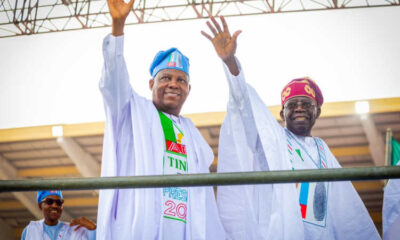
 Politics11 hours ago
Politics11 hours agoTinubu Gives Fani Kayode, Others New Appointments (See Full List)
-

 News11 hours ago
News11 hours agoDANGER! Ex-Soldier Abubakar Affan Vows to Kill VeryDarkMan ‘Like Deborah Samuel’
-

 News15 hours ago
News15 hours agoWhy NYSC maybe extended by FG- Minister
-

 News14 hours ago
News14 hours agoIbas moves to rehabilitate damaged Rivers LG secretariats
-
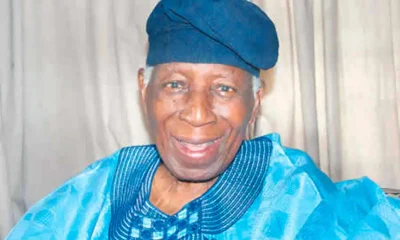
 News12 hours ago
News12 hours agoJust in: Ex-Oyo governor, Olunloyo is dead
-

 News15 hours ago
News15 hours agoWike commissions another solar-powered market in Abuja
-
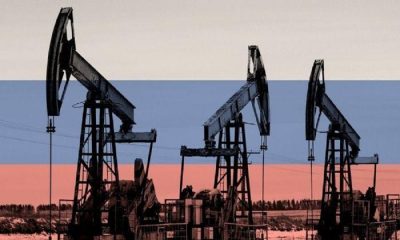
 Economy14 hours ago
Economy14 hours agoCrude prices slump to $65 first time since 2021
-

 News7 hours ago
News7 hours agoHerdsmen Storm Benue Hometown Of Ex-Senate President David Mark






